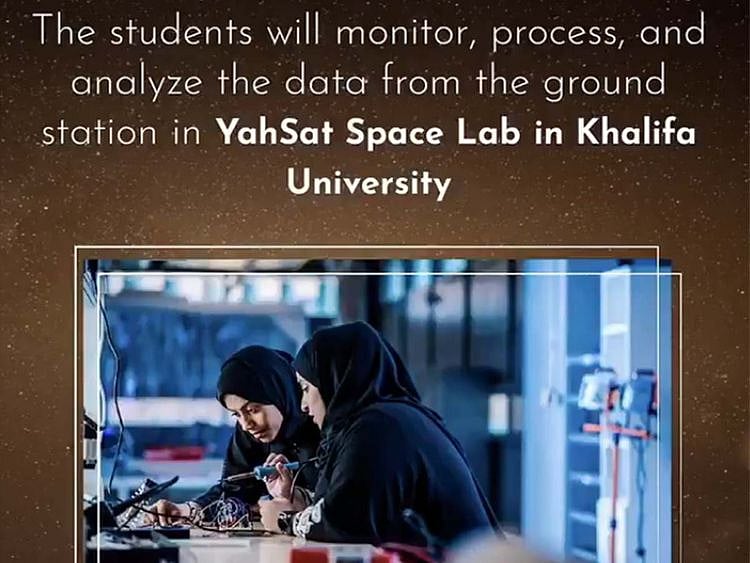Dubai: The UAE will send yet another satellite to space this month, less than two months after the successful launch of its Mars-bound Hope Probe, from the Tanegashima Space Centre in Japan.
MeznSat, the result of a collaboration between the UAE Space Agency, American University of Ras Al Khaimah (AURAK) and Khalifa University of Science and Technology (KUST), will be launched later this month aboard a Russian Soyuz rocket. The UAE’s first student-built satellite will study the coastal waters of the Arabian Gulf. It will also enrich scientific research and boost space-related activities while studying greenhouse gas and red tide phenomenon in the UAE, the Dubai Media Office (DMO) tweeted on Wednesday.
Also Read
#InternationalDogDay: 10 tips to keep your dog happy in the summerCOVID-19: UAE residents enjoy eating out once againPhotos: Gulf News reader shares pictures of the beautiful birds freely roaming in The Gardens Jebel Ali Dubai From the editors: Kids need protection online, Republican attack reveals nasty fight for White HouseBack to school: See how Dubai schools disinfect buses ahead of new termEmirati Women’s Day 2020: Celebrating women in every fieldStudents from AURAK and KUST who designed and built the satellite will monitor, process and analyse data from the ground station in YasSat Space Lab at Khalifa University
“They (students) will collect and analyse greenhouse gas emissions, specifically Carbon dioxide, methane concentrations and red tide phenomenon over the UAE using the shortwave infrared (SWIR) region (1650-1000nm),” according to DMO.
Student project
The development of MeznSat, a CubeSat or miniaturised satellite for space research began in 2017 as an education programme to design, build and operate a satellite. It was designed to study the UAE environment and also look at greenhouse gas emissions over the UAE, especially methane and carbon dioxide.
Abdul-Halim Jallad, director and assistant professor, Center of Information, Communication and Networking Education and Innovation (ICONET), had first announced the launch of MeznSat in June this year. He said the nanosatellite is designed to detect greenhouse gas concentrations from an orbit of 565km above the Earth.
“Once in orbit, the team of students will then monitor, process and analyse the data from a ground station in the UAE. The processes and expertise involved in monitoring the atmosphere are similar to those employed during conventional Earth Observation programmes. The project looks to support Emirati young people in developing the skillsets necessary for the UAE’s ambitious National Space Programme and its future projects,” Jallad was quoted in earlier reports.
Also Read
Airline employee in Dubai embezzles Dh162,000 worth of ticketsWatch: Use your passport at smart gates now to sail through immigration at Dubai Airport Terminal 3Dubai gets top rank in medical tourism destination in the region and sixth in the world Abu Dhabi to get free international coding and computer programming school in 2021MeznSat is part of a broader UAE nanosatellite programme, with a series of nanosatellites expected to be built by students from various universities.
Sign up for the Daily Briefing
Get the latest news and updates straight to your inbox
Network Links
GN StoreDownload our app
© Al Nisr Publishing LLC 2026. All rights reserved.
